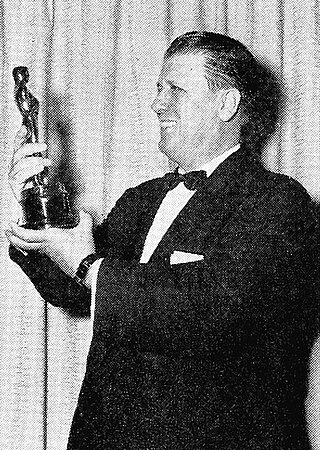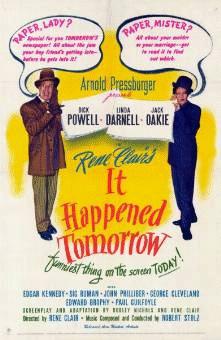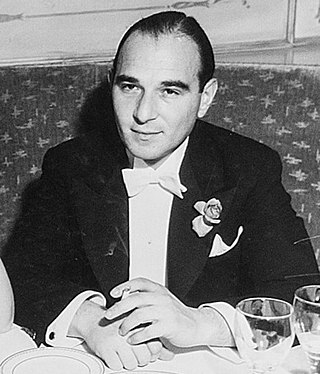
Cary Grant was an English-American actor. He was known for his Mid-Atlantic accent, debonair demeanor, lighthearted approach to acting, and sense of comic timing. He was one of classic Hollywood's definitive leading men. He was nominated twice for the Academy Award, received an Academy Honorary Award in 1970, and received the Kennedy Center Honor in 1981. He was named the second greatest male star of the Golden Age of Hollywood by the American Film Institute in 1999.

Suspicion is a 1941 romantic psychological thriller film noir directed by Alfred Hitchcock, and starring Cary Grant and Joan Fontaine as a married couple. It also features Sir Cedric Hardwicke, Nigel Bruce, Dame May Whitty, Isabel Jeans, Heather Angel, and Leo G. Carroll. Suspicion is based on Francis Iles's novel Before the Fact (1932).

Here Comes Mr. Jordan is a 1941 American fantasy romantic comedy film directed by Alexander Hall, in which a boxer, mistakenly taken to Heaven before his time, is given a second chance back on Earth. It stars Robert Montgomery, Claude Rains, Evelyn Keyes, James Gleason, Edward Everett Horton, Rita Johnson, and John Emery.

The More the Merrier is a 1943 American romantic comedy film directed by George Stevens and starring Jean Arthur, Joel McCrea, and Charles Coburn. The film's script—from Two's a Crowd, an original screenplay by Garson Kanin (uncredited)—was written by Robert Russell, Frank Ross, Richard Flournoy, and Lewis R. Foster. Set in Washington, D.C., the film presents a comic look at the housing shortage during World War II.

George Cooper Stevens was an American film director, producer, screenwriter and cinematographer. He received two Academy Awards and the Irving G. Thalberg Memorial Award in 1953.

Jean Arthur was an American Broadway and film actress whose career began in silent films in the early 1920s and lasted until the early 1950s.

To Catch a Thief is a 1955 American romantic thriller film directed by Alfred Hitchcock, from a screenplay by John Michael Hayes based on the 1952 novel of the same name by David Dodge. The film stars Cary Grant as a retired cat burglar who has to save his reformed reputation by catching an impostor preying on wealthy tourists on the French Riviera.

Stanley Earl Kramer was an American film director and producer, responsible for making many of Hollywood's most famous "message films" and a liberal movie icon. As an independent producer and director, he brought attention to topical social issues that most studios avoided. Among the subjects covered in his films were racism, nuclear war, greed, creationism vs. evolution, and the causes and effects of fascism. His other films included High Noon, The Caine Mutiny, and Ship of Fools (1965).

Joseph Leo Mankiewicz was an American film director, screenwriter, and producer. Mankiewicz had a long Hollywood career, and won both the Academy Award for Best Director and the Academy Award for Best Adapted Screenplay in consecutive years for A Letter to Three Wives (1949) and All About Eve (1950), the latter of which was nominated for 14 Academy Awards and won six.

People Will Talk is a 1951 American romantic comedy/drama film directed by Joseph L. Mankiewicz and produced by Darryl F. Zanuck from a screenplay by Mankiewicz, based on the German play by Curt Goetz, which was made into a movie in Germany. Released by Twentieth Century Fox, it stars Cary Grant and Jeanne Crain, with supporting performances by Hume Cronyn, Finlay Currie, Walter Slezak and Sidney Blackmer.

Only Angels Have Wings is a 1939 American adventure romantic drama film directed by Howard Hawks, starring Cary Grant and Jean Arthur, and is based on a story written by Hawks.
Sidney Robert Buchman was an American screenwriter and film producer who worked on about 40 films from the late 1920s to the early 1970s. He received four Oscar nominations and won once for Best Screenplay for fantasy romantic comedy film Here Comes Mr. Jordan (1941) along with Seton I. Miller.

It Happened Tomorrow is a 1944 American fantasy film directed by René Clair, starring Dick Powell, Linda Darnell and Jack Oakie, and featuring Edgar Kennedy and John Philliber. It is based on the one-act play "The Jest of Haha Laba" by Lord Dunsany.

Robert Riskin was an American screenwriter. He is best known for his collaborations with Frank Capra.

Like many institutions that draw public interest, the Supreme Court of the United States has frequently been depicted in fiction, often in the form of legal drama. While early depictions of the Supreme Court in fiction tended to be reverential, over time depictions became more critical and melodramatic. In some instances, real decisions rendered by real courts are dramatized, as in Gideon's Trumpet and the seminal trial in The People vs. Larry Flynt. Other depictions are purely fictional, but center on realistic issues that come before the court. Despite the comparative dearth of material on the Supreme Court in popular culture as compared to other branches of government, such depictions are "the primary source of the public's knowledge about the legal system as a whole, including the Supreme Court".

William Desmond was an American actor. He appeared in more than 200 films between 1915 and 1948. He was nicknamed "The King of the Silent Serials."

Together Again is a 1944 comedy film directed by Charles Vidor and starring Irene Dunne and Charles Boyer. The screenplay was written by F. Hugh Herbert and Virginia Van Upp, based on story by Herbert J. Biberman and Stanley Russell. The supporting cast features Charles Coburn and Mona Freeman.

Bill Cracks Down is a 1937 American action romantic drama film directed by William Nigh and starring Grant Withers, Beatrice Roberts, Ranny Weeks and Judith Allen. It was produced and distributed by Republic Pictures. The film was released under the alternative title Men of Steel in the United Kingdom.

No Hands on the Clock is a 1941 American comedy mystery film directed by Frank McDonald starring Chester Morris as detective Humphrey Campbell. The cast also included Jean Parker and Rose Hobart. It was produced by Pine-Thomas Productions and released by Paramount Pictures.

Frank Marlowe, also known as Frank Riggi and Frank Marlo, was an American character actor from the 1930s until the 1960s. During Marlowe's 30-year career he would appear in over 200 feature films, as well as dozens of television shows.


















